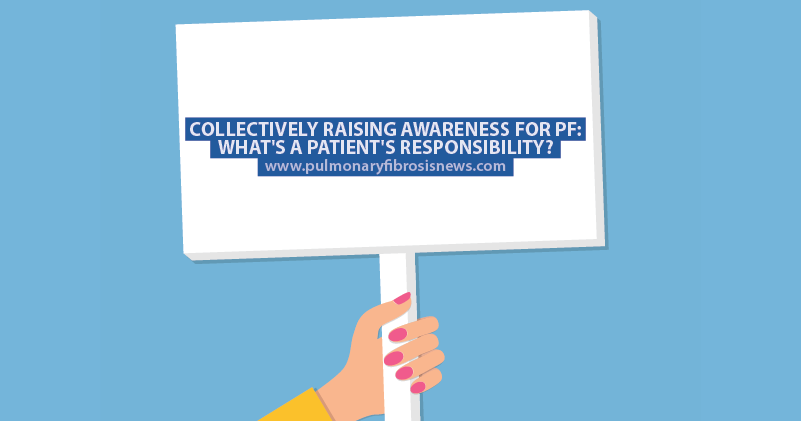Collectively Raising Awareness for PF: What’s a Patient’s Responsibility?

As October comes to a close and pink ribbons (the universal sign for breast cancer awareness) start to disappear, it’s hard not to feel as though some diseases take priority when it comes to awareness campaigns. If you ask someone whether or not they know the colour of breast cancer awareness, you are likely to find that most people can identify that it’s pink. Contrary to that, if you ask people if they know what the colours of the pulmonary fibrosis (PF) awareness ribbon are, you’re more likely to have people asking what PF is instead of answering your question.
Why is it that a disease that kills as many people per year as breast cancer has significantly less awareness?
For many chronic illnesses, funding for both research and improving the quality of life for patients often comes from awareness campaigns. These campaigns showcase the disease in hopes of generating funds that can go towards finding a cure.
However, a patient living with PF and their family or care providers often have so much on their plate just navigating the various needs of the disease that it can seem impossible to also fundraise and generate awareness.
And so the question is: what’s a patient’s responsibility when it comes to raising awareness of PF? How can someone living with this life-threatening disease do more to raise awareness when the tasks of daily living become so overwhelming and tiring due to shortness of breath and fatigue?
MORE: Four breathing exercises for pulmonary fibrosis
Here are a few ways that patients can help raise the profile of PF and create awareness in unique, impactful ways:
1. Harness the power of social media (and encourage friends to do the same).
While social media faces scrutiny for many reasons, it can also be incredibly powerful in creating public awareness about any given topic. You may recall the “Ice Bucket Challenge” for ALS that took over the Internet a few years ago, which generated millions of dollars and led to a breakthrough in research. This is a prime example of how one grassroots social media campaign had a huge impact. The same type of idea could used to generate awareness for many other diseases, including PF.
2. Look into group education opportunities.
Talk to your school, place of work, church network or in any other type of group setting. You can approach this specifically from the position of symptoms they could look for in the early stages of PF. Position this educational conversation from a point of caring about other people’s health and identifying the symptoms of PF early, which also creates an opportunity to educate others on the importance of lung health overall.
3. Share your story!
Nothing is more impactful when it comes to raising awareness about a disease than a personal story of how it has impacted someone’s life. This takes a lot of courage and strength, but it has the potential to create a ripple effect of people then talking about the disease and raising awareness of it, especially in the right context or environment.
4. Team up with disease-specific organizations or volunteer.
Specifically for PF, there are a few credible organizations dedicated to raising the profile of PF awareness including the Pulmonary Fibrosis Foundation or the Canadian Pulmonary Fibrosis Foundation. Teaming up with these organizations can be a great way to raise awareness, especially since they likely already have campaigns on the go. If not, perhaps you could collaborate with them on a new initiative that would help raise awareness of the disease or volunteer your time to a project that they are already working on.
MORE: Three professionals to talk to before traveling with pulmonary fibrosis
Pulmonary Fibrosis News is strictly a news and information website about the disease. It does not provide medical advice, diagnosis or treatment. This content is not intended to be a substitute for professional medical advice, diagnosis, or treatment. Always seek the advice of your physician or another qualified health provider with any questions you may have regarding a medical condition. Never disregard professional medical advice or delay in seeking it because of something you have read on this website.






